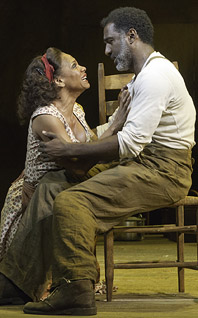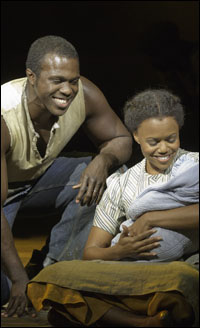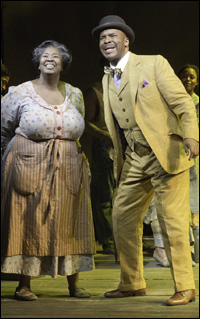
*
I loves you Porgy, and I has since first hearing the old Decca recording of Gershwin's Porgy and Bess — featuring members of the original 1935 Broadway cast — back when I was 10 in the mid-1960s. (Everyone else was listening to the Beatles, I was listening to the “Rhapsody in Blue” and Porgy.) The eagle-eyed reader will note that I say "Gershwin's Porgy and Bess"; I might just as easily call it George Gershwin's Porgy and Bess, or the Gershwin-Heyward Porgy and Bess. Which brings us to The Gershwins' Porgy and Bess, which opened at the Richard Rodgers Theatre in January and has recently arrived on CD from our friends at PS Classics.
Audiences, critics, and assorted Broadway types were of two minds — at least two minds — about the recent revival, or adaptation, or whatever you wish to call it. The easy answer is, there is no easy answer. The Gershwins' Porgy and Bess enjoyed a considerable degree of success from audiences, critics, and enough Tony Award voters to earn its many producers those spinning medallions (the 2012 Tony for Best Revival of a Musical). Theatergoers who loved this production are sure to love the resulting CD. Those who don't, along with diehard Gershwin traditionalists, might have a more checkered response.
The production had Audra McDonald singing Bess; even people who didn't buy The Gershwins' Porgy and Bess were likely to appreciate McDonald. Despite her Best Actress Tony Award win last June, I, myself, look forward to the day when she steps onto the stage at Carnegie or some such hall with a full orchestra to sing Gershwin's Porgy and Bess. For real.
That said, the new CD carefully and effectively recreates the revival, with Ms. McDonald joined by Norm Lewis, David Alan Grier, Phillip Boykin, Nikki Renee Daniels and Joshua Henry. What was heard in the theatre is a rough adaptation of the score for Porgy and Bess, but a good deal of the flavor and power of George's work was diminished. There are cases, of course, where a new set of arrangers and orchestrators can enhance what some lucky tunesmith plunked out on the old upright 80 years ago. But this ain't one of them. The problem is not that they had the nerve to change Gershwin; it's that the changes weaken the work, occasionally running roughshod over what I — at least — consider to be the composer's intentions.
| |
 |
|
| Audra McDonald and Norm Lewis | ||
| photo by Michael J. Lutch |
Before we move on, let us say a word about director Diane Paulus. The director of the recent successful revival of Hair and the artistic director of the American Repertory Theater, Paulus has been criticized for her cavalier treatment of Porgy and Bess (in general) and George Gershwin (specifically). And not all that fairly. The impression is that Paulus sat down and said, "somebody's gotta fix Porgy and Bess and I'm the one who knows how," and then talked the heirs into allowing it. My understanding, though, is that it was the heirs who went looking for someone to create a new version of Porgy and Bess. (They previously authorized a musically-diminished attempt, by Trevor Nunn no less, in London in 2006. That didn't work, either.) In this case, the heirs found Broadway producers willing to undertake the task; the producers, in turn, went and enlisted Paulus. So this was not the case of a director foisting her vision on an acknowledged and beloved classic; Paulus was asked by the people who — by right of inheritance — presently control the property, and she took up the challenge.
There has also been criticism — some of it directed at Paulus — about the title change from Porgy and Bess to, officially, The Gershwins' Porgy and Bess. The current version was, according to the billing page, "by George Gershwin, DuBose and Dorothy Heyward and Ira Gershwin." (The billing went on to add additional credits of "musical book adapted by Suzan-Lori Parks" and "musical score adapted by Diedre L. Murray," which for the purposes of this discussion are beside the point.) The original billing, worked out by the authors themselves back in 1935, was "music by George Gershwin; libretto by DuBose Heyward; lyrics by DuBose Heyward and Ira Gershwin." Heyward's wife Dorothy seems never heretofore to have been deemed an author of Porgy and Bess; she was co-author — with her husband — of the 1927 play version, which they adapted from DuBose's 1925 novel.
Visit PlaybillStore.com to view theatre-related recordings for sale.
| |
 |
|
| Josh Henry and Nikki Renée Daniels | ||
| Photo by Michael J. Lutch |
In the case of Porgy, it's that little apostrophe that causes the trouble. You can call it The Gershwins' Porgy and Bess, but it simply isn't and never was. George wrote the musical with DuBose Heyward. Along the way, Ira cheerfully stepped in to help out on some of the more Broadwayish material. Heyward was a blue-blood poet from Charleston, descended from a signer of the Declaration of Independence; the poetry of "Summertime" came to him naturally, but Sportin' Life tour de forces like "It Ain't Necessarily So" and "There's a Boat Dat's Leavin' Soon for New York" were Ira's territory.
I consider the score to have 28 identifiable songs (or scenes-with-lyrics). DuBose and Ira collaborated on three of these: "Bess, You Is My Woman," "I Got Plenty o' Nuttin'" and "I Loves You Porgy." Another five songs were written solely by Ira. The others, 19 of them, were credited solely to Heyward. (There is anecdotal evidence that Ira might have contributed significantly to those uncredited 19; both brothers were highly supportive and protective of Heyward.) Heyward also provided the libretto, which is to say not only the dialogue but the scenario; Ira, in his delightfully puckish "Lyrics on Several Occasions," gives full credit for this to Heyward. At any rate, the title The Gershwins' Porgy and Bess seems almost like a slap at the long-gone and all-but-forgotten-except-for-Porgy Heyward. But this is certainly not the doing of Paulus or the present-day producers. The title The Gershwins' Porgy and Bess was adopted by the Gershwin and Heyward heirs years ago; it has been in use since at least 1989.
| |
 |
|
| NaTasha Yvette Williams and David Alan Grier | ||
| photo by Michael J. Lutch |
Visit PlaybillStore.com to view theatre-related recordings for sale.
(Steven Suskin is author of "Show Tunes" as well as "The Sound of Broadway Music: A Book of Orchestrators and Orchestrations," "Second Act Trouble," the "Broadway Yearbook" series and the "Opening Night on Broadway" books. He also pens Playbill.com's Book Shelf and DVD Shelf columns. He can be reached at [email protected].)

































































Matthew-Murphy.jpg)
-Joan-Marcus-2022.jpg)






